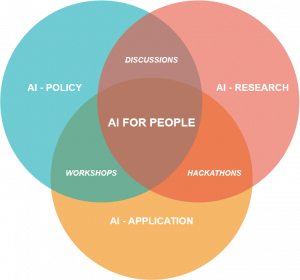
This initiative was born out of the idea of shaping Artificial Intelligent technology around human and societal needs. We believe that technology should respect the anthropocentric principle. It should be at the service of people, not vice-versa. In order to foster this idea, we need to narrow the gap between civil society and technical experts. This gap is one in knowledge, in action and in tools for change.
Our mission is to learn, pose questions and take initiative on how Artificial Intelligent technology can be used for the social good. Our strategy is to conduct impact analysis, projects and democratic policies that act at the crossing of Artificial Intelligence and society.

We are a diverse team of motivated individuals that is dedicated to bring AI Policy to the people, in order to create positive change in society with technology, through and for the public.
Board
Marta Ziosi
Marta Ziosi is an AI Policy enthusiast. She graduated in Public Policy and Philosophy at the London School of Economics with a thesis on ‘Epistemic Injustice in DataMining’. She holds a Bachelor of Science in Mathematics and Philosophy from University College Maastricht and she was an exchange student at UC Berkeley. She is particularly interested in the topic of Algorithmic fairness and on how to tackle injustices in the technological era.
Vincenzo Lomonaco
Vincenzo Lomonacois a Postdoctoral Researcher at the University of Bologna, Italy and President of ContinualAI. Currently, he is also a research affiliate at AI Labs. Vincenzo obtained his PhD at UniBo with a dissertation titled “Continual Learning with Deep Architectures“. He has been a visiting scholar at Purdue University, USA in 2017 and at the ENSTA ParisTech Grande École, France in 2018. His main research interests include continual learning with deep architectures, multi-task learning, knowledge distillation and transfer, their applications to embedded systems, robotics and internet-of-things, open science and ethical AI developments.
Angelo Trotta
Angelo Trotta received his Ph.D. degree in Computer Science and Engineering from the University of Bologna, Italy. In 2013 he was a Research Student for the Italian PRIN 2009 project “STEM-Net” working on the study, modeling and simulation of cognitive radio technologies and self-organizing wireless networks. He has been a visiting researcher at the Heudiasyc Laboratory, Sorbonne Universités, UTC, Compiègne, France in 2016 and at the Genesys-Lab, Northeastern University, Boston, MA, USA in 2018. Currently, he is a post-doc Research Fellow at the Department of Computer Science and Engineering, University of Bologna, Italy, working on reinforcement learning and nature-inspired algorithms for self-organizing multi-robots wireless systems.
Philipp Wicke
Philipp Wicke is an Assistant Professor (Akad. Rat) at the Ludwig Maximilian University (LMU). He is working on a diversity of topics related to Artificial Intelligence and Computational Linguistics. His doctoral thesis on Embodied Storytelling using Spatial Metaphor and Gesture provides a contribution to the research of Computational Creativity. In his current role at LMU, Philipp is researching on Natural Language Processing and teaches programming in the B.A. and M.A. Computational Linguistics. His background in Cognitive Science fields his research interest in Computational Creativity, Embodied Cognition and Artificial Intelligence. More at www.phil-wicke.com
Team Members
Aina Turillazzi
Head of Growth
Aina Turillazzi just graduated in Business and Economics at the University of Bologna. She is currently specialising in digital transformation by participating in research projects at the most prominent Italian Think Tank, Istituto Bruno Leoni. In the future, she sees herself as an economist with a strong foundation in data analysis, working at the intersection between the technical expertise of big data architects and public institutions, international organizations, and think tanks.
Gabriele Graffieti
Head of AI Research
Gabriele Graffieti is a PhD student in Data Science and Computation at the University of Bologna. His main interests are generative models, continual learning and bio-inspired learning models. In particular, he investigate the role of data generation ability during learning and the correlation between memory and the capacity to generate and think of new data. He is also fascinated by artificial creativity and computer generated art.
Moreover, he is interested in the philosophy and ethics of artificial intelligence, especially in frameworks that aims to counteract its future risks and problems.
João M. Cunha
Head of Communications
João Miguel Cunha is a cross-media Designer working in the intersection between AI and Design. He is currently pursuing his Ph.D. on Computational Creativity at the Computational Design and Visualization Lab (CISUC). He is interested in understanding how AI can be used for good, especially in the creative domain.
Lea Buchhorn
Head of Projects
Lea Buchhorn currently obtains a MSc in Cybersecurity Governance and a MSc in Economics and Governance at Leiden University. She holds a BA in Policy, Law and International Relations from University College Maastricht. Her main interests lies in Digital Ethics and particularly in how to take the chance of making AI Technologies more inclusive, and how to properly utilize AI in the public sector.
Maia Correrella
Intern
Maia Correrella is a Bachelor’s student at the University of Bologna, currently enrolled at her last year of the Business and Economics course. She is particularly interested in the no-profit sector, and in the processes that link ethics and human rights to technology, innovation, and Artificial Intelligence.
It is important to enlarge research in this direction and to involve more and more different disciplines in this domain. Hence, we also like to refer to other relevant, valuable initiatives such as AI for Good, AI4People and AI for the People Center.












